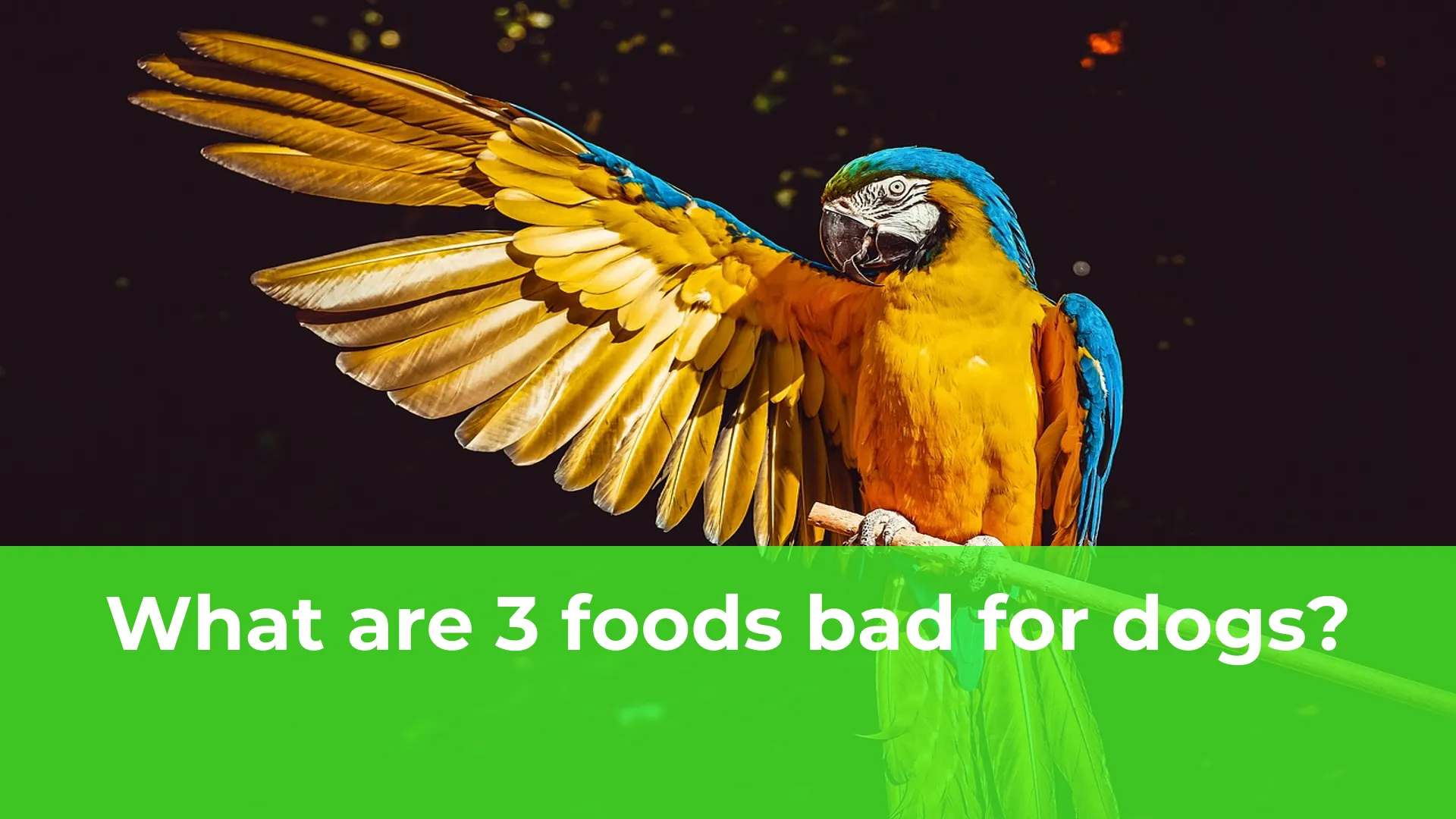What are 3 foods bad for dogs?
Dogs are undoubtedly man’s best friend, and as responsible pet owners, it is our duty to ensure their well-being. One crucial aspect of their care is their diet. While there are many foods that dogs can safely enjoy, there are also some that should be strictly avoided. In this article, we will explore three foods that are particularly bad for our furry companions.
First on the list is chocolate. Although it is a delightful treat for humans, chocolate contains theobromine, a compound that is toxic to dogs. Even a small amount can cause symptoms such as vomiting, diarrhea, elevated heart rate, and in severe cases, seizures or even death. It is essential to keep all chocolate products out of your dog’s reach, including candies, cakes, cookies, and cocoa powder.
The second food to be cautious of is grapes and raisins. While grapes may seem harmless to us, they can lead to kidney failure in dogs. It is not yet understood why some dogs are more susceptible to the toxic effects of grapes than others, but it is best to err on the side of caution. Keep grapes, raisins, and any products containing them, such as trail mix or certain baked goods, away from your furry friend.
1. Chocolate: A Dangerous Delicacy for Dogs
Chocolate is a delectable treat loved by many, but did you know that it can be potentially fatal for our furry friends? Dogs are particularly sensitive to the toxic effects of chocolate, which contains theobromine and caffeine. These substances can cause symptoms such as vomiting, diarrhea, increased heart rate, muscle tremors, and even seizures in dogs. It’s important for dog owners to be aware of the dangers and take necessary precautions to prevent their pets from ingesting chocolate. This article explores the risks associated with chocolate consumption in dogs and provides tips on how to keep your four-legged companions safe.
2. Grapes and Raisins: Hidden Hazards for Canines
Many pet owners are unaware of the potential dangers that grapes and raisins pose to their beloved canines. While these healthy snacks may seem harmless to humans, they can actually be highly toxic to dogs. Grapes and raisins can lead to kidney failure in dogs, which can be life-threatening. It is crucial for dog owners to be aware of this hidden hazard and take necessary precautions to keep their furry friends safe.
The exact substance in grapes and raisins that causes toxicity in dogs is still unknown, and it is important to note that not all dogs will have the same reaction. Some dogs may consume grapes or raisins with no apparent side effects, while others may suffer severe consequences even from ingesting a small amount. The symptoms of grape or raisin poisoning in dogs include vomiting, diarrhea, lethargy, decreased appetite, abdominal pain, and increased thirst and urination. If you suspect that your dog has consumed grapes or raisins, it is crucial to seek immediate veterinary care to prevent further complications.
3. Onions and Garlic: Seasonings to Skip When Feeding Fido
While onions and garlic may be staple seasonings in many human dishes, they are actually harmful to our furry friends. It’s important to be aware of the potential dangers these ingredients pose when it comes to feeding our dogs. Onions and garlic contain compounds that can cause oxidative damage to a dog’s red blood cells, leading to a condition called hemolytic anemia. This can result in symptoms such as weakness, lethargy, pale gums, and even collapse in severe cases.
Even small amounts of onions or garlic can be toxic to dogs, so it’s crucial to avoid giving them any foods that contain these ingredients. This includes not only raw onions and garlic but also any products that may have been seasoned or cooked with them. It’s important to read ingredient labels carefully, as onions and garlic can be found in various forms, such as powders, flakes, or even as hidden ingredients in certain sauces or seasonings. It’s always better to err on the side of caution and keep these seasonings out of your dog’s diet entirely.
If you suspect that your dog has ingested onions or garlic, it’s essential to seek veterinary assistance immediately. The veterinarian may induce vomiting or administer activated charcoal to help prevent further absorption of the toxins. The treatment will depend on the severity of the ingestion and the symptoms exhibited by the dog. Remember, prevention is key, so make sure to keep onions and garlic out of your dog’s reach and be cautious of any foods that may contain these harmful seasonings.
4. Xylitol: The Sweetener That Can Sour Your Dog’s Health
Xylitol: The Sweetener That Can Sour Your Dog’s Health
Discover the hidden danger lurking in your pantry. Xylitol, a popular sugar substitute, has gained popularity among health-conscious individuals, but pet owners need to be aware of its potential harm to their furry companions. Despite its natural origins, xylitol can be highly toxic to dogs, leading to severe health complications and even death. This article explores the dangers of xylitol consumption for dogs and provides essential information for pet owners to keep their beloved pets safe.
5. Avocado: A Fruit That’s Off-Limits for Dogs
Avocado: A Fruit That’s Off-Limits for Dogs
Avocados have become an increasingly popular food choice for health-conscious individuals seeking a nutrient-rich and versatile addition to their diet. However, pet owners should be aware that avocados are not suitable for their furry companions. Despite their many health benefits for humans, avocados contain a toxic compound called persin, which can be harmful to dogs.
While avocados may seem like a harmless and tasty treat, it is crucial to know the potential risks they pose to our four-legged friends. The persin found in avocados can cause a variety of health issues in dogs, ranging from mild gastrointestinal upset to more severe symptoms such as difficulty breathing and pancreatitis. It is important to remember that dogs have different metabolic systems than humans, making them more susceptible to certain foods’ toxic effects, including avocados.
6. Alcohol: A Serious No-No for Canine Consumption
Alcohol: A Serious No-No for Canine Consumption
While many of us enjoy a glass of wine or a bottle of beer to unwind after a long day, it’s important to remember that alcohol is strictly off-limits for our furry friends. Canine consumption of alcohol can have serious and potentially life-threatening consequences. Even a small amount can cause alcohol poisoning, leading to symptoms such as vomiting, diarrhea, difficulty breathing, and in severe cases, coma or death. The effects of alcohol on dogs are much more pronounced than on humans due to their smaller size and differences in metabolism. It is crucial for dog owners to be vigilant and keep all alcoholic beverages safely out of their pets’ reach. If you suspect your dog has ingested alcohol, seek immediate veterinary assistance.
7. Coffee and Caffeine: Harmful Stimulants for Your Four-Legged Friend
As coffee lovers, we often enjoy our morning cup of joe to kickstart our day. However, it’s crucial to understand that coffee and caffeine can be harmful stimulants for our four-legged friends. While we may be able to handle the effects of caffeine, it can have severe consequences for dogs and cats. In this article, we will delve into the potential dangers of coffee and caffeine consumption for pets and provide essential guidelines to ensure their safety.
8. Bones: Not All Treats are Safe for Dogs to Chew On
Dogs love to chew on bones, and it’s a common sight to see them happily gnawing away. However, not all bones are safe for dogs to chew on. In fact, giving your furry friend the wrong kind of bone can lead to serious health issues. It’s important for dog owners to educate themselves about the types of bones that are safe for their pets and to be aware of the potential risks associated with the wrong ones.
One of the biggest dangers of giving dogs the wrong bones to chew on is the risk of dental damage. Some bones, especially cooked ones, can splinter easily and pose a serious risk of breaking your dog’s teeth. These sharp bone fragments can cause cuts and abrasions in your dog’s mouth and throat, leading to pain, discomfort, and potential infection. It’s crucial to choose bones that are safe and appropriate for your dog’s size and chewing habits.
Another risk of giving dogs unsafe bones to chew on is the potential for gastrointestinal blockages. Dogs that swallow large pieces of bone can experience obstructions in their digestive tract, which can be extremely painful and require surgical intervention to remove. Small bones, such as those from chicken or fish, can also pose a choking hazard if swallowed whole. It’s always best to choose bones that are large enough to prevent your dog from swallowing them whole and to monitor their chewing to ensure they don’t attempt to swallow large chunks.
9. Dairy Products: Cautionary Tales for Canine Lactose Intolerance
Dairy Products: Cautionary Tales for Canine Lactose Intolerance
While many of us love indulging in dairy products, it’s important to remember that not all animals can handle them as well as we do. Canine lactose intolerance is a common condition that can cause discomfort and digestive issues for our furry friends. In this article, we will explore the dangers of feeding dairy products to dogs and provide some alternative options for a healthy and balanced diet.
For centuries, dogs have been known to enjoy the occasional treat of milk or cheese. However, recent studies have shown that a large percentage of dogs actually lack the enzyme lactase, which is responsible for breaking down lactose, the sugar present in milk. Without enough lactase, dogs are unable to properly digest dairy products, leading to symptoms such as diarrhea, vomiting, and stomach pain.
10. Artificial Sweeteners: Doggy Dangers Lurking in Unexpected Places
Artificial Sweeteners: Doggy Dangers Lurking in Unexpected Places
Many pet owners are aware of the dangers of certain foods for dogs, such as chocolate and grapes. However, one often overlooked threat to our furry friends comes in the form of artificial sweeteners. These sugar substitutes, commonly found in diet sodas, sugar-free candies, and even some medications, can be highly toxic to dogs. As responsible pet owners, it’s crucial to be aware of where these hidden dangers may lurk and take necessary precautions to keep our four-legged companions safe.
One of the most dangerous artificial sweeteners for dogs is xylitol. This sweetener, which is found in numerous sugar-free products, can cause a sudden and severe drop in a dog’s blood sugar levels. Ingesting even a small amount of xylitol can lead to symptoms such as vomiting, loss of coordination, seizures, and, in some cases, liver failure. It’s especially important to be cautious with items like chewing gum and breath mints, as they often contain high levels of xylitol that can pose a serious threat to dogs.
Frequently Asked Questions (FAQ)
What are the top 10 toxic foods for dogs?
The top 10 toxic foods for dogs are chocolate, grapes/raisins, onions/garlic, alcohol, caffeine, xylitol, avocado, macadamia nuts, raw dough, and certain types of mushrooms.
What are the 3 super foods for dogs?
The 3 super foods for dogs are salmon, blueberries, and sweet potatoes. These nutrient-rich foods provide essential omega-3 fatty acids, antioxidants, and vitamins for a healthy and balanced diet.
What 3 meats should dogs avoid?
Dogs should avoid consuming pork, lamb, and processed meats. These meats can be high in fat, salt, and other harmful additives that can negatively affect their health.
What are 13 human foods toxic to dogs?
Common human foods toxic to dogs include chocolate, grapes, raisins, onions, garlic, avocado, alcohol, caffeine, xylitol (found in sugar-free gum and candies), macadamia nuts, yeast dough, certain types of nuts like walnuts and almonds, and some artificial sweeteners.




